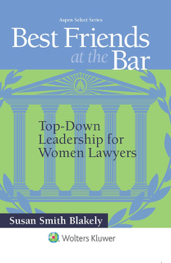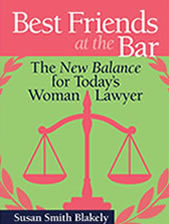I recently attended a Prelaw Advisors Conference in Las Vegas at UNLV Law School. The conference was sponsored by the Western Association of PreLaw Advisors (WAPLA), a subgroup of the National Association of Prelaw Advisors (NAPLA). Because my book includes so much information for undergraduate women who are considering law school, this is a great market that I am just beginning to tap. Not only did I sell some books at the conference, I also found that the pre-law advisors who attended are a very caring group. They spend a lot of time thinking about their students and making sure that they are giving them good advise about their futures.
One of these advisors, Professor Eileen Crane of Utah Valley University, particularly impressed me. Her program is called Connected Lawyers are Happy Lawyers, and I want you to know about it and use it to your best advantage. Professor Crane was generous and gave me permission to tell you about it. That’s how much she cares about the future of today’s undergraduate and law students.
The program is simple but has the potential to be very effective. The objective is to put students interested in law careers in touch with practitioners so that the students can learn more about the actual practice of law. That should help them to make better decisions when it comes to going to law school and will help them avoid the default decision to attend law school because they cannot think of anything else to do after graduation from college. The more practicing lawyers they meet, the better chance they will have of going to law school for the right reasons. The program also has another objective—to create a network of practitioners that may be able to help, mentor or guide students as they progress through law school and first years of practice. Of course, these kinds of relationships can have a great advantage when you are looking for a job in a difficult job market.
Both of these are laudable objectives, and starting them at the undergraduate level makes perfect sense. However, even if you did not begin this kind of information gathering and networking when you were in college, it is not too late. Law school is an excellent time to do this, and you will be exposed to many lawyers and judges at that level who can enrich your experiences. Take advantage of those opportunities, and make them work for you.
So, here is the gist of the program that Professor Doyle has pioneered at Utah Valley University. Make this your mantra.
Get to know at least 100 lawyers by the time you graduate from law school and create a personal and professional safety net for your future in the law. By doing this, you not only will learn more about how law is actually practiced (in contrast to the theory that is taught to you in law school—see my earlier blog that discusses the difference), but you also will gain information that may decrease some of the problems that many professionals in highly stressed situations often experience. Some of those problems are depression, divorce, alcoholism, suicide and malpractice. Sounds grim, I know, but these are serious problems, and the more you know about what causes them the more likely you are to avoid them.
This program is highly dependent on networking. Networking skills area critically important in the practice of law where generation of work is the end-all and be-all, and the earlier you learn to network effectively the better. Professor Crane suggests that you go about it in this way. Contact an attorney and invite him or her to lunch or breakfast, respecting the time and place requirements of the lawyer. Be sure to volunteer to pay for the meal. Ask specific questions about practicing law, and be sure that you put some thought into what those questions will be prior to the meeting. Ask for the names of two other attorneys who might be willing to meet with you. Afterwards, e-mail or call the attorney to thank him or her for meeting with you—-yes, it is OK to use e-mail in this situation. Most practitioners live on e-mail and appreciate the convenience of it as a method of communication. If you have met with any of the other lawyers that were recommended, share the valuable information that you received from them with the attorney who recommended them.
Simple, right? But, you say, it will take time. YES IT WILL, but it will help you to make an informed decision about law school, about specialty of practice and whether you want to practice in the private sector or the public sector or in-house. It will be time well invested, and will save you hours of time in the future when you may have even less time to consider your options.
Professor Crane points out the consequences of not taking this advice. They are, among others: Lower career satisfaction; fewer contacts for professional support; increased isolation in practice; and inability to repay school loans if you become unemployed, are under-employed or are inappropriately employed.
Hats off to Professor Crane! I hope you all take the lead in spreading the word about this program and adopting it for yourself. It would be a great program to start with your law student organization or forum. Think of the possibilities, and it could all start with you.












